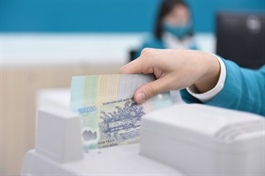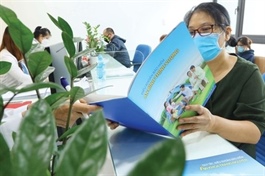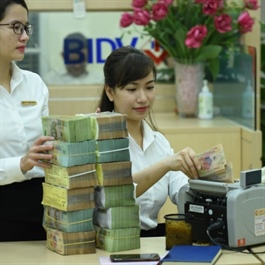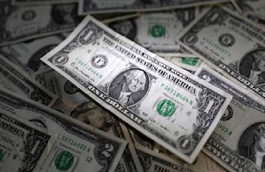Special consumption tax on alcoholic beverages requires careful study: economists
Special consumption tax on alcoholic beverages requires careful study: economists
Further comprehensive and in-depth studies must be carried out to fully evaluate the impact of a proposed tax increase on alcoholic beverages, said participants at a conference to gather opinions and feedback on the proposed tax organised by the Vietnam Economic Association (VEA) in Hà Nội yesterday.
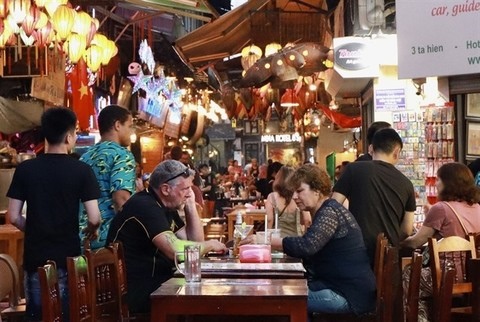
Tourists in capital city of Hà Nội seen on a street food. — VNA/VNS Photo |
Economists and industry experts said a balanced approach is required in implementing the changes to Việt Nam's special consumption tax law, which will see tax double for alcoholic beverages from 2026 to 2030.
Professor Chử Văn Lâm, vice president of the VEA, said the industry has considered the tax hike as a pressing issue, garnering attention from all players in the industry and other related industries.
Lâm said opponents of the tax hike are raising significant concerns, including the lack of a comprehensive study on how different tax rates will affect the industry in the short, medium and long term.
"Only after studying different scenarios can we determine the optimal approach to ensure the feasibility of our objectives," he said.
The VEA stressed the importance of treading slowly, given the current economic context, in order to improve public health and quality of life as well as the ability of businesses to adapt.
Vũ Sỹ Cường, a lecturer from the Academy of Finance, said that like many other countries around the world, Việt Nam uses special consumption tax to control the consumption of non-essential harmful products, expand the government's tax base and compensate for economic loss caused, directly or indirectly, by the consumption of said products.
He said that compared to other countries, Việt Nam's tax revenue from special consumption tax accounts for only around 1.7 per cent of GDP, and about eight per cent of its tax revenue. This leaves a lot of room for tax increases and is likely one of the reasons why the Ministry of Finance is in support of the proposal.
"The Government must strike a balance in approaching the three objectives and the most optimal solution must balance all three. This is a difficult task," he said.
In a conference earlier this week organised by the Vietnam Institute for Economics and Policy Research (VEPR), representatives from the Vietnam Beer-Alcohol-Beverage Association said the industry is still struggling to recover from the COVID-19 pandemic and the country's recent effort to end its rampant DUI problem.
To make matters worse, logistics costs have been rising due to ongoing geopolitical problems. The industry has suffered significant damage, with many businesses forced to scale down production, reduce the workforce or even shut down, creating pressure for local governments in implementing their socio-economic development strategy.
The association recommended the Government delay the tax hike until 2027 and decrease the maximum tax to 80 per cent in 2031, giving businesses additional time to adapt.
Economists said it's important to view the tax hike as something that will start a chain reaction through the economy because similar to other industries, the industry is part of many supply chains and a large source of income for the state's coffer.
Dr Nguyễn Minh Thảo from the Central Institute for Economic Management (CIEM) said even the State budget will likely get hurt in the long run.
"Our data points to a surge in the short-term, followed by a gradual decrease in the medium and longer-term. The short gains from the ministry's proposal, in our researchers' opinion, are not enough to justify the net loss," she said.
In addition, raising taxes on alcoholic beverages will not guarantee a reduction in alcohol consumption, as consumers can switch to cheap products with dubious health and quality standards. A surge in smuggling and counterfeiting activities should also be expected, as criminals see more profit as demand for cheap products increases. This will only hurt businesses, which contribute significant amounts to the State budget.
Economists say there were examples in which countries imposed heavy taxes on alcohol only to remove them later on because of the negative consequences on the tourism industry and the economy. They recommended looking into models in which the special consumption tax rate is based on CPI, as a means to ensure the tax hike is proportionate with consumers' purchasing power.
They advised the Government to take a comprehensive approach to building a special consumption tax law and learn from successful international examples.







